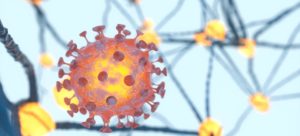Now it’s been almost a year since the novel coronavirus began spreading from one part of the world to another. With every passing day, since the outbreak, the novel coronavirus kept on spreading fast from one country to another, and within a quick time, it encompassed the entire world. In a period of ten or eleven months, the Covid-19 pandemic has affected more than 43 million individuals and taken the lives of over 1.15 million people worldwide.
The Severe Acute Respiratory Syndrome Coronavirus 2 (SARS-CoV-2) is responsible for causing the Covid-19 pandemic and subsequent lockdown that has brought the entire world to a standstill. Although the novel coronavirus primarily affects the respiratory system, a considerable number of Covid-19 affected individuals have suffered and are suffering from neurological problems.
Scientists have decoded neurological symptoms of novel coronavirus infection. They have identified the likely tissues that the SARS-CoV-2 attacks and the route that it takes to gain an entry into the central nervous system.

Developments In The Recent Months
Lately, the number of Covid affected patients suffering from neurological symptoms such as anxiety, depression, sense of taste and smell, frequent headache, etc. has increased significantly. In the CSF of many patients, physicians have detected SARS-CoV-2. Several neurological complications such as Encephalitis, Guillain-Barre syndrome, Ageusia, Anosmia, Acute Cerebrovascular disorder, and many more have been aggravating the health condition of Covid-19 positive individuals.
Where To Head Next?
Physicians are now more involved in conducting diagnostic, clinical and epidemiological studies to better define the neurological disease’s manifestations and stress caused by SARS-CoV-2. They are more involved in distinguishing non-specific complications of certain severe disorders from those that the coronavirus causes directly or indirectly.
Detecting any neurological issues in patients affected by Covid-19 and suffering from a mild infection in the respiratory system or asymptomatic is still a challenge for doctors. The size of infections causing neurological ailments is expected to remain small. However, with time, more Covid-19 affected patients could suffer from severe neurological diseases. With the increase in the number of such patients across the world, besides the associated burden on physical and mental health conditions, the patients are expected to experience social and financial issues in the coming times.
Epidemiology Of Covid-19 Responsible For Neurological Illnesses
Almost every country around the globe has been striving to check the spread and severity of the COVID-19 pandemic by leveraging one or the other measure. However, all attempts to contain coronavirus until now have turned out to be futile. Doctors have been found commenting that despite the rare occurrence of neurological complications in MERS, SARS and COVID-19, the number of confirmed cases with neurological issues will only increase if the current situation aggravates due to the spread of the pandemic.
At present, the existence of complications in the Central Nervous System ranges for SARS from 0.04% to 0.22% for MERS. On the other hand, the prevalence of Peripheral Nervous System ranges for SARS from 0.05% to 0.16% for MERS.
Neurological Disorder Investigation
With the relentless spread of SARS-CoV-2 worldwide and the rise in the toll of Covid confirmed cases with neurological issues, it is becoming increasingly important for top-notch diagnostic, clinical and epidemiological studies. Doctors are focusing more on adopting a systematic approach when it comes to conducting a thorough investigation of patients with coronavirus associated neurological disorder. They are systematically considering the substantial evidence for viral infection and the existing clinical diagnosis.
SARS-CoV-2 has been causing a notable number of mildly symptomatic or asymptomatic infections in Covid confirmed patients. Remember that individuals affected by one or the other neurological disorder from beforehand are prone to and could become infected with the coronavirus. In recent months, a considerable number of patients with mild or severe infections in the brain have become Covid-19 positive due to their existing conditions.
Patients with cerebrovascular illness, neuropathy or acute disseminated encephalomyelitis get affected due to their weak response to viral infection. It is becoming increasingly challenging to determine casualty when the virus is taken out from the nasopharynx. Clinicians take cerebral angiography, brain biopsy, intracranial vessel wall imaging, etc. into consideration when they get the responsibility to cure patients with stroke.
The increasing prevalence of coronavirus pandemic and the matter that most individuals who have had a stroke are prone to certain high-risk factors suggest that it is a bit difficult to become certain about causation. Only if diligent case-control studies are performed consistently, proving the association of neurological disorder with SARS-CoV-2 will become easier. Doctors have been striving to detect neurological complications early to better clinical results and ensure improved treatment algorithms.
If you have been looking for an ideal solution within your budget to streamline diagnostic workflow, simply visit sepStream® without looking anywhere else. We have been ensuring comprehensive, easy-to-use and reliable solutions that help create a completely digital and efficient work environment. Since our inception, we have been providing solutions tailored to individual requirements.